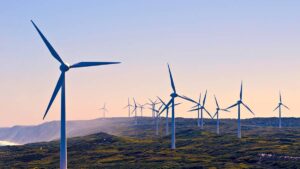FFI stays busy on the global hydrogen trail with new MOU to decarbonise the aviation sector

Pic: Matthias Kulka / The Image Bank via Getty Images
Another day, another green hydrogen deal in a global locale for Fortescue Future Industries (FFI).
This time FFI has joined forces with Los Angeles-based Hydrogen Co, with plans to decarbonise the aviation industry through zero emissions green hydrogen.
In an announcement today, FFI said green hydrogen is an “ideal aviation fuel” because it is a zero pollution, renewable resource that only generates water when it is burned.
“It is also the most weight-efficient energy carrier available, aside from nuclear fuels – with nearly four times more energy per unit of mass than traditional jet fuel.”
Under the Memorandum of Understanding (MOU) signed today, FFI and Universal Hydrogen have agreed to:
- Negotiate a global off-take arrangement whereby FFI will supply green hydrogen to Universal Hydrogen to power regional and other aviation sectors until 2035;
- Conduct a scoping study to develop green hydrogen production and logistics hubs in Iceland, New Zealand, and Southeast Queensland; and
- Evaluate future green hydrogen demand in the aviation industry on a region-by- region basis to identify and promote green hydrogen adoption and uptake.
“Electrifying our planes will only go so far”
FFI chairman Andrew Forrest said currently, aviation accounts for 2.5pc of global carbon dioxide emissions with emissions having doubled since the 1980’s.
“Electrifying our planes will only go so far and will only be appropriate for smaller aircraft, due to current limitations around battery technologies,” he said.
“Green hydrogen, in contrast, is a practical solution we can use right now.”
“Universal Hydrogen has an ambitious plan to help fight climate change, with a goal of making hydrogen-powered commercial flights a reality – and FFI is committed to enabling that target.”
FFI to lead on green hydrogen production
The plan is for FFI to take the lead on green hydrogen production activities and supply to the identified markets or green H2 hubs, while Universal Hydrogen takes the lead on delivery logistics to airports and on-airport fuel services.
Universal Hydrogen, in which FFI is also an early investor, is building a flexible, scalable, and capital-light solution to hydrogen logistics for aviation through its modular capsule technology.
These capsules can be filled with gaseous and liquid hydrogen and are delivered from the point of production directly to the aircraft using existing freight networks and cargo handling equipment.
Universal Hydrogen is also developing a powertrain retrofit kit to enable regional passenger and cargo airplanes to be converted to fly on hydrogen.
The first test flight of Universal Hydrogen’s technology is anticipated in 2022, with revenue services planned for 2025.
Australia scores the lowest on climate policy in new analysis
Elsewhere in the green energy landscape, Australia has scored the lowest on climate policy in a new analysis by the Climate Change Performance Index (CCPI), an independent monitoring tool tracking the Paris Agreement’s implementation phase among 60 countries and the European Union, which together generate 90pc+ of global greenhouse gas emissions.
Using standardised criteria, four categories are analysed with 14 indicators: greenhouse gas emissions (40pc of the overall score), renewable energy (20pc), energy use (20pc), and climate policy (20pc).
The report said no country performs well enough in all CCPI index categories to achieve an overall very high rating (reason for the first three spots remaining empty) and “even if all countries were as committed as the current frontrunners, it would still not be enough to prevent dangerous climate change,” it said.
Overall, Australia slipped to 58th place in this year’s CCPI from 54th last year.
Denmark scores top place
Denmark took out this year’s top performing spot, followed by Sweden, Norway, and the United Kingdom.
Within two decades, the report said Denmark has “shifted from high dependency on coal to a remarkably high share of wind and biomass power.”
More than 40pc of the country’s primary energy supply now comes from renewable sources, and Denmark’s government plans to reduce greenhouse gas emissions (GHG) by 70pc by 2030 to reach net zero by 2050.
Australia, on the other hand, has continuously performed “very low” in the CCPI rating and this year scored the worst possible rating it could receive in every category.
Of the country’s energy mix, the reports says “92pc relies on fossil fuels as of 2020” and the Morrison government isn’t taking significant action to alter this picture.
The CCPI-experts claim that the country has been damaged by “climate denialism by politicians, refusal to increase ambition, and refusal to recommit to international green finance mechanisms.”
Even with renewable electricity growing, the experts believe Australia has failed to take advantage of its potential, and its allies have outpaced it.
Related Topics
UNLOCK INSIGHTS
Discover the untold stories of emerging ASX stocks.
Daily news and expert analysis, it's free to subscribe.
By proceeding, you confirm you understand that we handle personal information in accordance with our Privacy Policy.








